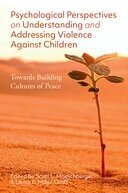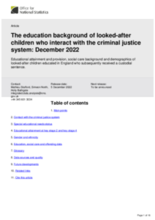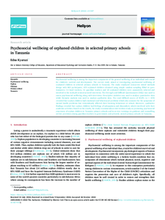Displaying 841 - 850 of 10391
This chapter in the book, "Psychological Perspectives on Understanding and Addressing Violence Against Children: Towards Building Cultures of Peace", explores how violence impacts children in various types of alternative care from larger scale institutions such as orphanages to family-based care models like foster care. The book explores the topic from a global perspective.
This analysis conducted by the UK Office for National Statistics explores the education and social care background of care-experienced young people in England who were imprisoned at any point up to the age of 24 years.
Children in care are 10 times more likely to end up in prison by the time they reach 24 than those who grew up outside the system, official figures suggest. The study by the Office for National Statistics (ONS) published today found that looked-after children were more at risk of coming into contact with the criminal justice system during early adulthood than their peers.
Olena Merzliakova, a psychologist and Ph.D. in Psychology, shared effective and simple tips for parents. She is one of the experts engaged for the EU-funded hotline established this summer by the UNDP.
This report presents the findings of an online survey and individual interviews which explored the experiences of carers providing out-of-home care to infants in New South Wales. While there is increasing research related to the care of children and young people requiring out-of-home Care, there is comparatively less specifically related to the care of infants. The findings highlight a need to provide increased training, support, and resources for new carers of infants in out-of-home care.
This study aimed at investigating the psychosocial wellbeing of orphaned children in selected primary schools in Tanzania.
This World Health Organization report, "What works to prevent online violence against children", presents ways to address the growing worldwide concern of keeping children safe online, with a specific focus on two forms of online violence: child sexual abuse including grooming and sexual image abuse; and cyber aggression and harassment in the form of cyberbullying, cyberstalking, hacking and identity theft. The report recommends implementing school-based educational programmes that have multiple sessions, promote interaction among youth and engage parents.
This is the third report by Coram Voice and The Rees Centre at University of Oxford exploring learning from the Your Life, Your Care surveys that are part of the Bright Spots Programme. It is an analysis of 9,472 responses from children and young people (aged 4-18 years) collected between 2016 and 2021 from 38 Local Authorities in England. The findings build on previous overview reports and the pilot stage in 2015 that involved 611 children and young people. By 2021, the research team had gathered over 10,000 voices from children in care in England.
These are the key findings and recommendations of a report produced by Coram Voice and The Rees Centre at University of Oxford that captures the views of 10,000 children and young people in care in the UK on their wellbeing. This report summarises responses collected through the largest survey of its kind from children and young people aged 4-18 years between 2016 and 2021, giving unprecedented insight into children in care’s subjective wellbeing.
This report produced by Coram Voice and the NYAS (National Youth Advocacy Service) captures the views of care-experienced children and young people in the UK on recommendations set out in the independent review of children’s social care in England.








